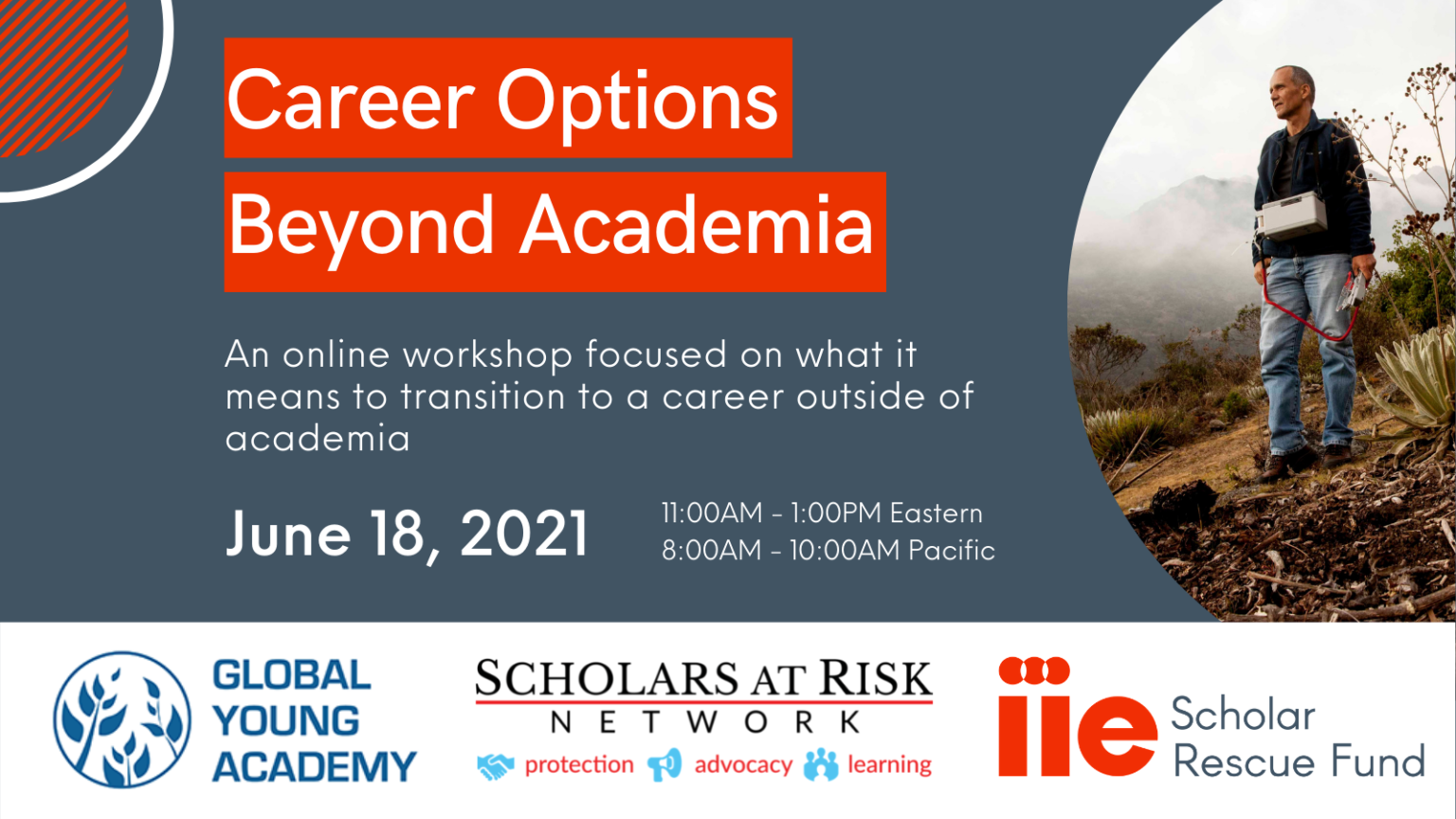“The academic systems in many countries are marred by a systemic imbalance between the number of Ph.D. holders and the number of permanent academic positions, forcing many academics to either opt for precarious employment or to eventually leave the sector altogether,” says GYA member and co-lead of the GYA At-Risk Scholars Initiative, Teresa Stoepler (National Academy of Sciences, USA). “While this problem concerns all early career researchers, threatened and displaced scholars face additional hurdles, such as the lack of acknowledgement in many academic systems for scholarly work in different languages and scholars’ lack of networks in their new countries.”
Amidst these challenges, many threatened and displaced scholars opt to explore positions outside of a traditional, research-oriented academic job or even outside of academia altogether. The GYA At-Risk Scholars Initiative recently partnered with IIE-Scholar Rescue Fund (SRF) and Scholars at Risk to offer an online workshop, “Career options beyond academia,” which explored questions such as:
- What does the process of transitioning outside of traditional academia look like?
- How can researchers use their skills for securing jobs outside of research universities?
- Once outside of the academic community, are there ways of staying connected?
The workshop placed a geographic focus on North America, taking into account different academic and employment structures in different regions. Three panelists shared their experiences, offering insights on their transitions to careers outside of traditional, research-focused academia.
Panel Speakers
“At first, I felt like a fish out of water looking for positions outside academia,” says Dr Burcu Seyben, a scholar of performing arts management who undertook IIE-SRF fellowships at Bennington College in Vermont from 2017 to 2019 and who is now an instructor in the Theater Department at the College of Southern Idaho, a community college. “But when I started looking, the horizon opened, and I started discovering new opportunities. Community colleges are institutions that teach many immigrants. Becoming part of that community, I felt like I belonged.” Burcu highlighted the new opportunities the transition has presented, including more teacher training, a closer connection to the community she works in, and more practical experience in theatre itself.
Bernadette So, Executive Director for the Career Development Center at Rutgers University-Newark, discussed her transition out of academia after completing her PhD in Molecular Biology at UCLA. At Rutgers, she now oversees career services for all undergraduate and graduate students, and alumni for the campus. Bernadette emphasized that it takes work to re-frame one’s narrative away from academia and research, and that a non-faculty job can still allow one to be an academic. She encouraged anyone considering expanded career options to focus their thinking on what they can offer, and how their skills can be applied in new contexts, rather than focus on what may be perceived to be lost.
Dr Mehmet Canturk, a physicist and computer engineer who undertook IIE-SRF fellowships at Canada’s University of Waterloo from 2019 to 2021, is now a research software developer at 1QBIT, a quantum computing software company in Vancouver. He spoke with participants about the importance of exploring many possible ideas and remaining curious throughout the search for a new path, as one would in scientific inquiry. “Industry has many options, so make sure to explore them,” he advises. “Then focus on what you want and pursue it.”
About 45 participants – invited scholarship holders from the SAR or SRF programmes, as well as mentors – attended, with most reporting that they benefitted from the personal stories shared by the scholars and hoped to participate in similar workshops in the future.
About the Organizers
The Global Young Academy is a global network of early to mid career scholars from over 80 countries around the world that helps develop, connect, and mobilise young talent and strengthen the voice of young scientists and scholars. Through its At-Risk Scholar Initiative, GYA members and alumni serve as peer mentors to at-risk and displaced scholars, working closely with partner organizations like the Scholar Rescue Fund and Scholars at Risk.
The Institute of International Education’s Scholar Rescue Fund is a global program that arranges and funds fellowships for threatened and displaced scholars at higher education institutions worldwide. Since 2002 it has supported 902 scholars from 60 countries with 433 host institutions in 50 countries.
Scholars at Risk is an international network of institutions and individuals whose mission it is to protect scholars and promote academic freedom. By arranging temporary academic positions at member universities and colleges, Scholars at Risk offers safety to scholars facing grave threats, so scholars can keep working and can contribute their expertise to new academic communities until they are able to return to their home countries.
